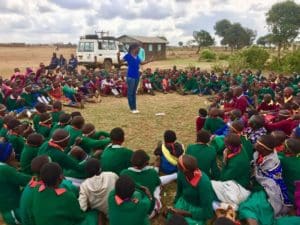Creating a Generation of Young Peacebuilders to Safeguard the Future. Member Spotlight: Jane Kinyua.
A famous quote from Nelson Mandela cites that the “children of today are the leaders of tomorrow”. These words underline the key importance that educating and working with youth can play, not exclusively in the present, but with a wise look to the future. Jane Kinyua made of such a lesson her mission. Besides being a peacebuilding passionate, Jane figures among the founders of Children Peace Initiative Kenya, a non-profit organization specializing in conflict prevention and peacebuilding by particularly working with children as entry points into communities in conflict. She recent joined MBBI, after having attended last year Congress in Bali, where she got inspired by MBBI’s powerful vision.
From community living to community relief and peacebuilding in rural Kenya.
 Jane comes from a remote village in the rural part of Kenya. Speaking about her youth spent far from urban centres, she is enthusiast to remember the family fabric and communal spirit bonding the whole community where she lived. This experience certainly would impact her interest for trying to play an active role in easing inter-community conflict in the future. Due to educational necessities she moved to Nairobi, the capital of the country, to pursue her college and university studies, eventually undertaking a Bachelor in Sociology at the Catholic University of Eastern Africa. Regarding the decision to specialize on this subject, Jane explains: “I had always thought to feel really alive when I was interacting with people, and I believed that undertaking this pattern would give me a chance to know how positively and constructively I could have an impact on others”. Nevertheless, she admits that even though the course had a special focus on working with children, she initially felt a bit lost regarding what to do concretely with such educational basis.
Jane comes from a remote village in the rural part of Kenya. Speaking about her youth spent far from urban centres, she is enthusiast to remember the family fabric and communal spirit bonding the whole community where she lived. This experience certainly would impact her interest for trying to play an active role in easing inter-community conflict in the future. Due to educational necessities she moved to Nairobi, the capital of the country, to pursue her college and university studies, eventually undertaking a Bachelor in Sociology at the Catholic University of Eastern Africa. Regarding the decision to specialize on this subject, Jane explains: “I had always thought to feel really alive when I was interacting with people, and I believed that undertaking this pattern would give me a chance to know how positively and constructively I could have an impact on others”. Nevertheless, she admits that even though the course had a special focus on working with children, she initially felt a bit lost regarding what to do concretely with such educational basis.
The 2007-08’ was a biennium of turmoil and unrest for Kenya. Post-electoral clashes broke out in the country, impacting the civilian population in the midst of the violence. By contrast, the same period turned out to be revelatory for Jane. Indeed, as she started volunteering within Internally-Displaced Persons (IDPs) camps hosting civilians that had been forced out of their homes, she witnessed the despair generated by war at its full scale. “What I saw and perceived there transformed my life. My heart said to me that I should have had to work to prevent such events from happening again”. That epiphanic instance was the beginning of the path that would shape her career all along.
Moved by a renewed spirit, Jane decided to join a team of law students traveling to the North of the country to address cases of inter-community conflict by promoting dialogue. However, the fact that children have mostly left out from these reconciliatory efforts stroke Jane, who felt she had to do something. In fact, Jane noted with a deeper conviction, even the younger members of the communities were deeply impacted by conflict, thus they should not be completely excluded. The idea that youngsters should not be solely considered within peacebuilding efforts, but that they have the potential to represent the remedy to the conflict began to take shape in Jane’s mind. At first, she was contracted by the Diocese of Marsabit, in the North of Kenya, as a Consultant commissioned to organize activities for the children belonging to opposing communities. At the end of the first 5-days program, the impact was strikingly powerful not only in creating strong bonds between the children but also in getting the members of the two communities, who were fathers and mothers of the kids involved, closer and more open. Soon after, the idea of “plating a seed of unity” among children to trickle inter-community peacebuilding led to the creation of the Children Peace Initiative Kenya (CPI).
Children Peace Initiative: working with children to ease and prevent inter-community violence.
 CPI was founded in 2011 as a non-profit entity. Although the first steps of the organization were not easy to make, the collaboration with a solid network of local stakeholders, among which government structures, consecrated its success. Jane goes on to explain the vision of CPI. The foundation is moved by the conviction that many of the protracted inter-community and tribal conflicts scourging various areas of Kenya (there are more than 42 different ethnic groups and tribes in the country!) are fundamentally hinging upon stereotypes and biases, which are passed down from one generation to the other. Kids, however, are usually less biased and more prompt to discovery than adults. Therefore, by working with younger minds and nurturing them with peacebuilding principles as a lifestyle, enduring change can be brought and more empathetic, understanding, and collaborative human beings can be formed. “Children used to be told by their parents that the members of the other community were bad people, even if they had never met them. By bringing them together, we gift them the possibility to create their own narrative and to debunk stereotypes and prejudices”. Long-lasting change in individuals’ attitudes and inter-community relations is hence ensured.
CPI was founded in 2011 as a non-profit entity. Although the first steps of the organization were not easy to make, the collaboration with a solid network of local stakeholders, among which government structures, consecrated its success. Jane goes on to explain the vision of CPI. The foundation is moved by the conviction that many of the protracted inter-community and tribal conflicts scourging various areas of Kenya (there are more than 42 different ethnic groups and tribes in the country!) are fundamentally hinging upon stereotypes and biases, which are passed down from one generation to the other. Kids, however, are usually less biased and more prompt to discovery than adults. Therefore, by working with younger minds and nurturing them with peacebuilding principles as a lifestyle, enduring change can be brought and more empathetic, understanding, and collaborative human beings can be formed. “Children used to be told by their parents that the members of the other community were bad people, even if they had never met them. By bringing them together, we gift them the possibility to create their own narrative and to debunk stereotypes and prejudices”. Long-lasting change in individuals’ attitudes and inter-community relations is hence ensured.
CPI’s action is organized according to different lines of work. The Children for Peace Building Program, for example, focuses on using friendship as a powerful peacebuilding channel. In short, children of conflicting communities are brought together in a series of peace-related activities that contribute to creating bonds among them. In turn, these activities and close relationships established between the children influence the behaviour of the parents and the elders from the communities. “Working through the children is powerful and act directly at the grassroots, since the children that became friends can convince, directly or indirectly, their parents to meet and establish a dialogue”. In other programs, children are taught mediation and the basics of conflict resolution to manage peer-to-peer conflict as they grow older. These skills trigger a domino effect in their communities, which will be better equipped to deal with future disputes both internally and externally. “Peacebuilding is a skill needed throughout life” Jane concludes, “but when you plant a seed in an individual at a very early age, before the mindset is polluted, peacebuilding becomes a lifestyle”.
Rotary Scholar and MBBI Member.
 Jane continues to thirst for knowledge. In 2017, she was granted the Rotary Peace Fellowshipand moved to the United States to undertake the Master of Arts in Peace and Justice studies at theUniversity of San Diego. As a Rotary scholar, she attended the 2019 MBBI International Congress in Bali where she got to know the work of MBBI. Her falling-in-love with MBBI was immediate. “When I saw that the title of the Congress was ‘Disruptors’ I thought: ‘I am a Disruptor! In the end, CPI Kenya is all about disrupting social-cultural norms and social biases”. Particularly, Jane was attracted by the networking potential of MBBI and by its mission of disseminating local skills for conflict transformation, which matches CPI Kenya’s core values.
Jane continues to thirst for knowledge. In 2017, she was granted the Rotary Peace Fellowshipand moved to the United States to undertake the Master of Arts in Peace and Justice studies at theUniversity of San Diego. As a Rotary scholar, she attended the 2019 MBBI International Congress in Bali where she got to know the work of MBBI. Her falling-in-love with MBBI was immediate. “When I saw that the title of the Congress was ‘Disruptors’ I thought: ‘I am a Disruptor! In the end, CPI Kenya is all about disrupting social-cultural norms and social biases”. Particularly, Jane was attracted by the networking potential of MBBI and by its mission of disseminating local skills for conflict transformation, which matches CPI Kenya’s core values.
While living and completing her studies in San Diego, Jane is working as a Family Services Case Manager in a charter school, especially dealing with coaching peer mediation to middle school pupils. Even far from home, Jane remains faithful to her mission: creating a generation of young peacebuilders to safeguard the future. As she loves to say, in some ways recalling Mandela’s mantra, “there is power in an empowered mind”. When you seek to empower the people around you, you are slowly contributing to changing the world, there is no doubt about that.
Written by Matteo Piovacari: MBBI Writer
